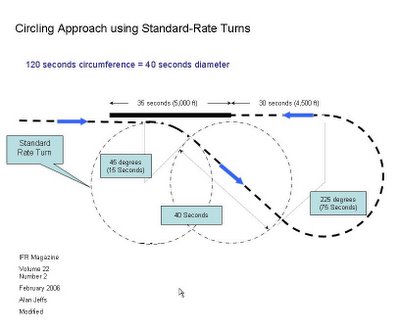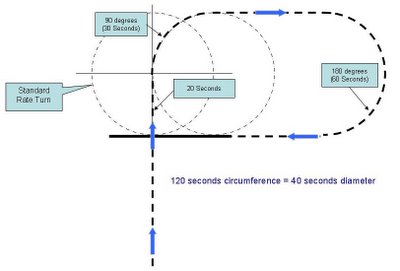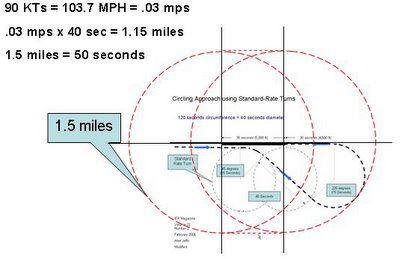
I read an article in this months IFR Magazine (Feb 06) by Alan Jeffs describing his method to determine a circling approach. I think this looks pretty good, but would like to hear from the more experienced aviators out there. (Modfications suggested by John.)
How do you do it?
Extrapolating on the theme, how about this for a VOR A type approach?

It was pointed out that staying within 1.5 miles of the airport should be a serious consideration. While not to scale, the approximate diameters indicate that this is a valid concern and should go into the planning, along with corrections for wind. (Thanks again John, for the clarification.)




My experience with circling approaches both as a cargo pilot and as an instructor is that they are riskier that straight in approaches. Anything that reduces the risk, like doing standard rate turns, seems sensible to me.
ReplyDeleteThe illustration assumes an approach course that is aligned with the runway, but that isn't always the case.
In poor visibility, I'm not one for flying directly over the runway. Instead, I'd want to be offset at least slightly (preferably to the right side) so I could keep the runway lights in sight.
The problem I've seen over and over is pilots carrying too much speed as they begin the circling maneuver. With a circling approach, chances are pretty good that you will essentially be on downwind when you parallel the runway and that will give you a high ground speed.
If you slow things down (extend the gear, set approach flaps) prior to reaching the missed approach point, then you'll get a higher rate of turn for a given bank angle. Slow down and you should obviate the need for anything other than a standard rate turn.
If you have the required visibility and you've slowed down, there no need to be so close to the runway as to require a steep turn.
If you are in a Skyhawk and you use the Category B circling minima, you can still stray up to 1.5 miles from any portion of the runway and still be
guaranteed obstruction clearance. Of course read the fine print for any circling restrictions!
I think standard rate turns should be just fine if you control your airspeed and adhere to the approach minima.
If you use Jepp charts, have the airport diagram handy so you can get oriented. NACO charts have the airport diagram inset in the approach, but you might need your reading glasses!
Hey Dave,
ReplyDeleteThe circling distance for category B aircraft is 1.5 miles from any portion of the runway. Or as the AIM puts it:
"Circling approach protected areas are defined by the tangential connection of arcs drawn from each runway end."
A good illustration can be found: here.
So while timing and standard rate turns could provide a useful heuristic, you'd need to use visual references to make sure you don't stray to far.